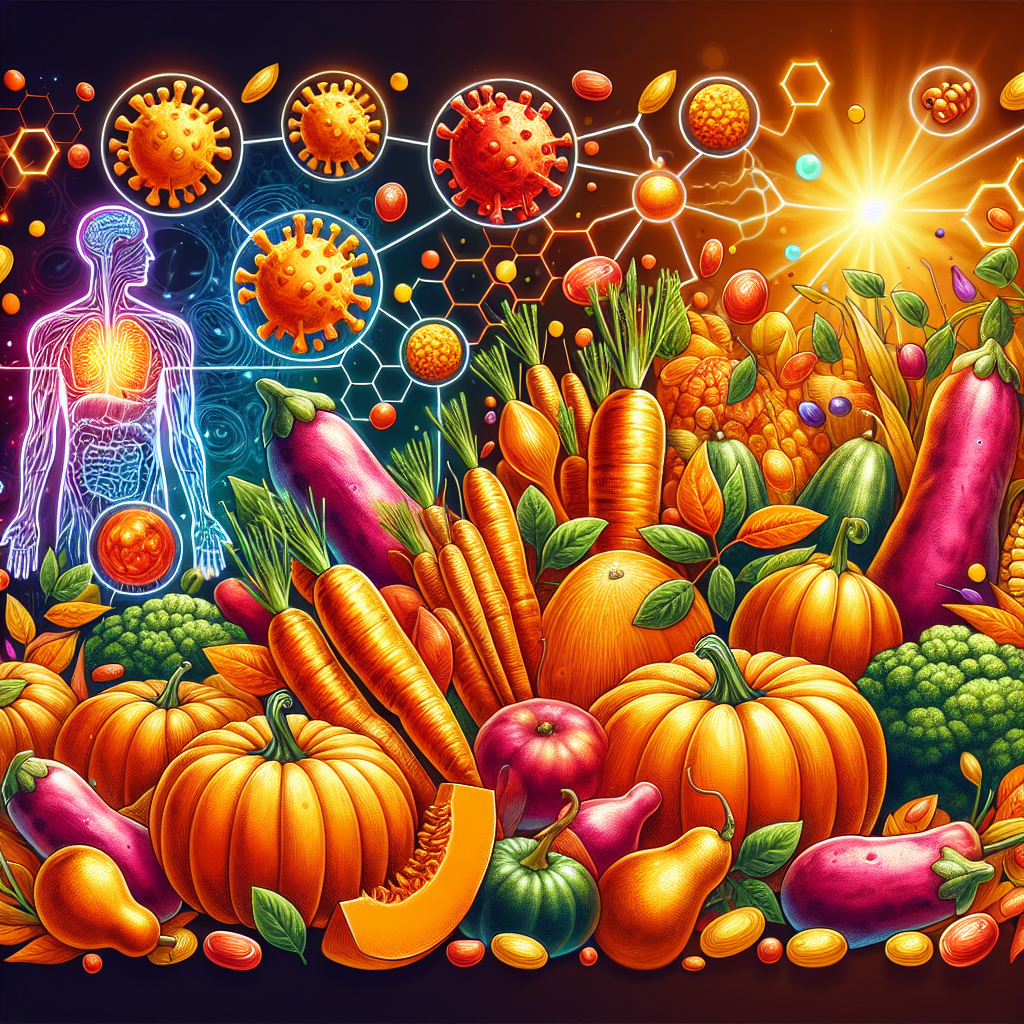Did you know that the vibrant colors of vegetables aren’t just visually appealing, but they also play a crucial role in supporting your immune health? Beta-carotene, a powerful antioxidant found in various vegetables, acts as a shield for your immune system, helping to protect it against harmful free radicals. By incorporating beta-carotene-rich foods into your diet, such as carrots, sweet potatoes, spinach, and kale, you can give your immune system the boost it needs to keep you feeling healthy and strong. So go ahead, add a splash of color to your plate and reap the benefits of a robust immune system.
The Importance of a Healthy Immune System
Your immune system plays a crucial role in protecting your body against harmful bacteria, viruses, and other pathogens. It is responsible for recognizing and eliminating foreign invaders, as well as maintaining a state of balance and harmony within your body. Without a healthy immune system, you would be more susceptible to infections, illnesses, and diseases.
Understanding the immune system
The immune system is a complex network of cells, tissues, and organs that work together to defend your body against foreign substances. It is composed of two main components: the innate immune system and the adaptive immune system.
The innate immune system acts as the first line of defense and includes physical barriers like your skin, as well as white blood cells known as phagocytes and natural killer cells. These cells quickly respond to any potential threats in order to eliminate them.
The adaptive immune system, on the other hand, provides a more specific response to a particular pathogen. It recognizes and remembers specific antigens, allowing your body to mount a stronger and faster immune response upon subsequent exposures.
The role of beta-carotene in supporting immune health
Beta-carotene is a powerful antioxidant that plays a vital role in supporting immune health. It is a type of carotenoid, a natural pigment found in many fruits and vegetables. In your body, beta-carotene is converted into vitamin A, which is essential for the proper functioning of your immune system.
The Benefits of Beta-Carotene
What is beta-carotene?
Beta-carotene is a fat-soluble compound that belongs to a larger group of carotenoids called provitamin A carotenoids. It is found in abundance in many fruits and vegetables and is responsible for their vibrant orange, yellow, and red colors. Beta-carotene is a precursor to vitamin A, meaning it is converted into vitamin A when needed by your body.
Sources of beta-carotene
There are numerous sources of beta-carotene, making it easily accessible through a healthy and balanced diet. Some of the richest sources include carrots, sweet potatoes, spinach, kale, apricots, cantaloupes, and red bell peppers. By incorporating these foods into your diet, you can ensure an adequate intake of beta-carotene to support your immune health.
Antioxidant properties of beta-carotene
Beta-carotene possesses potent antioxidant properties, which means it helps to neutralize harmful free radicals in your body. Free radicals are unstable molecules that can cause damage to cells and tissues, leading to inflammation and oxidative stress. By reducing the levels of free radicals, beta-carotene helps to protect your immune cells from damage and maintain their optimal function.

Enhancing Immune Function with Beta-Carotene
Boosting immune cell production
Beta-carotene plays a crucial role in the production of immune cells, such as lymphocytes and phagocytes. These cells are responsible for identifying and eliminating pathogens, keeping you healthy and protected against infections. By ensuring an adequate intake of beta-carotene, you can support the production of these essential immune cells.
Strengthening immune cell function
In addition to promoting immune cell production, beta-carotene also enhances the function of these cells. It helps to regulate the activity of immune cells, ensuring an appropriate response to pathogens without excessive inflammation. This balanced immune response is crucial for maintaining optimal immune health and preventing chronic inflammation.
Reducing inflammation and oxidative stress
Chronic inflammation and oxidative stress can weaken your immune system and make you more susceptible to infections and diseases. Beta-carotene helps to reduce inflammation by inhibiting the production of pro-inflammatory molecules, thereby promoting a healthier immune response. It also neutralizes free radicals, reducing oxidative stress and protecting your immune cells from damage.
Reducing the Risk of Infections
Protecting against respiratory infections
Beta-carotene has been shown to play a protective role against respiratory infections, such as the common cold, flu, and even pneumonia. It enhances the function of immune cells in the respiratory tract, strengthening the mucosal barrier and preventing the entry of pathogens. By incorporating beta-carotene-rich foods into your diet, you can reduce the risk of developing respiratory infections.
Lowering the risk of gastrointestinal infections
In addition to respiratory infections, beta-carotene also helps to lower the risk of gastrointestinal infections. It supports the health of the gastrointestinal tract by strengthening the mucosal lining and enhancing the function of immune cells in the gut. This can help to prevent infections caused by harmful bacteria, viruses, and parasites.
Supporting the body in fighting off infections
When your body is fighting off an infection, it relies heavily on the immune system to eliminate the pathogen and restore health. Beta-carotene supports this process by providing the necessary resources for your immune cells to function optimally. It ensures that your immune system has the firepower it needs to effectively combat infections and keep you healthy.

Supporting Immune Health in Specific Populations
Benefits for children’s immune systems
Children have developing immune systems that require proper support to function optimally. Beta-carotene can play a crucial role in supporting their immune health by promoting the production and function of immune cells. Including beta-carotene-rich foods in their diet can help boost their immune system and reduce the risk of infections.
Importance for pregnant women
During pregnancy, a woman’s immune system undergoes changes to accommodate and protect the developing fetus. Beta-carotene is essential during this time as it supports the proper functioning of the immune system without compromising the health of the baby. Pregnant women should ensure an adequate intake of beta-carotene through a varied and balanced diet.
Impact on the elderly’s immune systems
As we age, our immune system naturally weakens, making us more vulnerable to infections. Beta-carotene can help support immune health in the elderly by enhancing immune cell function and reducing inflammation. By including beta-carotene-rich foods in their diet, older adults can strengthen their immune system and improve overall well-being.
Maximizing the Absorption of Beta-Carotene
Importance of food synergy
To maximize the absorption of beta-carotene, it is important to consume it in the presence of other nutrients that enhance its absorption. For example, consuming beta-carotene-rich foods with a source of healthy fat, such as avocado or olive oil, can increase its absorption. Additionally, combining beta-carotene with foods high in vitamin C can also enhance its absorption.
Enhancing absorption with healthy fats
Beta-carotene is a fat-soluble compound, meaning it is better absorbed when consumed with dietary fat. Including healthy sources of fat, such as nuts, seeds, and olive oil, in your meals can help enhance the absorption of beta-carotene. This ensures that your body can fully utilize the beta-carotene and reap its immune-supporting benefits.
Cooking methods to preserve beta-carotene content
Certain cooking methods can affect the beta-carotene content in foods. To preserve the maximum amount of beta-carotene, it is advisable to lightly cook or steam vegetables instead of boiling them. Boiling can cause some of the beta-carotene to leach into the cooking water. Adding a dash of lemon juice or vinegar can also help to retain more beta-carotene during the cooking process.

Potential Risks and Considerations
Overconsumption and toxicity
While beta-carotene is generally safe when consumed through whole foods, excessive intake of beta-carotene supplements can result in a condition known as carotenosis. Carotenosis is a harmless condition characterized by orange or yellow discoloration of the skin. It is important to consult with a healthcare professional before taking any beta-carotene supplements to avoid potential adverse effects.
Interactions with medications
Beta-carotene supplements may interact with certain medications, including statins, certain cancer drugs, and blood thinners. If you are taking any medications, it is important to discuss the use of beta-carotene supplements with your healthcare provider to ensure there are no potential interactions.
Individual variations in beta-carotene absorption
Everyone’s ability to absorb and convert beta-carotene into vitamin A can vary. Certain genetic variations, digestive conditions, and lifestyle factors can affect the absorption and conversion of beta-carotene in the body. It is important to listen to your body and work with a healthcare professional to determine the optimal intake of beta-carotene for your individual needs.
Incorporating Beta-Carotene-Rich Foods into Your Diet
Top vegetables rich in beta-carotene
There are numerous vegetables that are rich in beta-carotene, making it easy to incorporate into your diet. Some of the top choices include carrots, sweet potatoes, spinach, kale, butternut squash, and red bell peppers. Adding these vegetables to your meals or enjoying them as snacks can help increase your beta-carotene intake and support immune health.
Delicious recipes to try
Incorporating beta-carotene-rich foods into your diet can be both nutritious and delicious. Try making a vibrant carrot ginger soup, a refreshing spinach and strawberry salad, or a comforting sweet potato and kale curry. These recipes not only provide a good amount of beta-carotene but also offer a variety of other essential nutrients for overall well-being.
Tips for meal planning
Planning meals in advance can help ensure a balanced and varied diet that includes beta-carotene-rich foods. When meal planning, consider incorporating a variety of colorful fruits and vegetables into your meals and snacks. Aim to have at least one serving of beta-carotene-rich food at each meal to support your immune system and overall health.

Supplements as an Option
When supplements may be beneficial
While a healthy diet should be the primary source of beta-carotene, supplements may be beneficial in certain situations. For individuals who have difficulty meeting their nutrient needs through diet alone, beta-carotene supplements can help bridge the gap. It is important to consult with a healthcare professional to determine the appropriate dosage and duration of supplementation.
Choosing a high-quality supplement
When choosing a beta-carotene supplement, it is important to select a high-quality product from a reputable manufacturer. Look for supplements that have been tested for purity, potency, and quality. Additionally, consider supplements that include other immune-supporting nutrients, such as vitamin C, vitamin E, and zinc, for optimal immune health.
Consulting with a healthcare professional
Before starting any new supplement regimen, it is always advisable to consult with a healthcare professional, especially if you have any underlying health conditions or are taking medications. They can help assess your individual needs and provide personalized recommendations to support your immune health.
In Conclusion
Beta-carotene plays a vital role in supporting immune health. It enhances immune cell production, strengthens immune cell function, and reduces inflammation and oxidative stress. By reducing the risk of infections and supporting immune health in specific populations such as children, pregnant women, and the elderly, beta-carotene is an essential nutrient for overall well-being.
Incorporating beta-carotene-rich foods into your diet is the best way to ensure an adequate intake. By maximizing the absorption of beta-carotene through food synergy, healthy fats, and proper cooking methods, you can optimize its benefits. However, supplements may be beneficial in certain situations, and it is important to choose high-quality products and consult with a healthcare professional. With the right approach, you can harness the power of beta-carotene to support your immune system and maintain optimal well-being.


